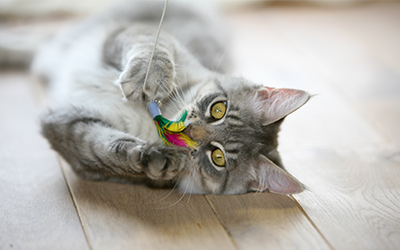
It’s Respect Your Cat Day on March 28. This is an opportunity to celebrate and recognise our feline friends and the love they bring into our lives.
But fully respecting a cat means much more than just giving them attention. Pet parents need to know how to treat and handle their cats and take care of them, properly.
The following tips can help improve the relationship between you and your cat and will show them, just how much you truly respect them.
How do I pet my cat?
Cats can be choosy about where, how, and when they like to be touched. Some cats do not like to be touched much at all, so pet parents should be considerate when petting them. This is especially important for children, so they know how to pet a cat without disturbing them.
Petting a cat can be quite different than petting a dog. When you do touch them, pet them around their head and neck area. This is where they enjoy it most. Stay away from their tails, paws, and particularly, a cat’s tummy.
What is the best way to hold my cat?
The more a cat is touching you, the more comfortable they will be. When you hold them, it’s best to keep them close to your body so they feel more secure. The more they sense they aren’t going to fall, the more secure they will feel.
While this might work for some cats, there are cats who might not like to be held much at all. Pet parents should know that this is perfectly okay. Like humans, cats have different personalities. It does not mean they do not love you.
When should I ‘scruff’ a cat?
Scruffing a cat is a technique to be used for emergencies only. Naturally, mother cats pick up their kittens by the scruff of their neck when they are very young, to carry them or to discipline them.
You should not scruff a cat unless it is absolutely necessary, for example, to prevent them from chasing another animal, or from running into the street.
How do I maintain my cat’s coat?
Cats do not like being bathed. If you try this, you can expect your cat to protest, mightily!
Luckily, cats don’t need to be bathed very often, and many don’t need baths at all unless they get into something particularly dirty.
However, cats do enjoy being brushed, so you should groom their coats to keep them neat and clean.
Regular brushing keeps their coat healthy and helps keep your cat healthy overall. Long-haired cats can develop problems with knots and matted hair, so it’s very important to brush them, daily.
How can I make sure my cat isn’t bored?
Cats need attention just like any other pet. If you are busy throughout the day, there are some great toys that can keep your cat’s attention. Robotic toys that move by themselves and food dispensing toys are a great distraction for your cat. It’s important to remember, however, that these toys should not be used as a replacement for you physically playing with your cat.
How can I better understand my cat’s body language?
Just like humans, not all cats are the same. They have individual personalities. While some are playful and love attention, some prefer to be left alone. They might get along well with some people and not with others.
Cats show their affection in subtle ways such as rubbing against your legs, rubbing their nose against yours, or running after you to get your attention.
It is important to understand your cat’s body language. Knowing what basic body movements mean can improve your relationship with them.
For example, knowing the difference between aggression and fear is very important. Similarly, when your cat exposes their belly to you, it isn’t necessarily an invitation for a tummy rub.
A big part of respecting your cat is understanding them as well as taking care of them. This will ultimately improve your relationship with your special feline friend.
